- Home
- John le Carré
A Murder of Quality Page 2
A Murder of Quality Read online
Page 2
Miss Brimley, the journal’s editor, adjusted the air cushion beneath her and lit a cigarette. Her secretary and sub-editor – the appointment carried both responsibilities – yawned, dropped the aspirin bottle into her handbag, combed out her ginger hair and bade Miss Brimley good night, leaving behind her as usual the smell of strongly scented powder and an empty paper-tissue box. Miss Brimley listened contentedly to the clipping echo of her footsteps as it faded down the corridor. It pleased her to be alone at last, tasting the anticlimax. She never failed to wonder at herself, how every Thursday morning brought the same slight uneasiness as she entered the vast Unipress building and stood a little absurdly on one escalator after the other, like a drab parcel on a luxury liner. Heaven knows, she had run the Voice for fourteen years, and there were those who said its layout was the best thing Unipress did. Yet the Thursday feeling never left her, the wakeful anxiety that one day, perhaps today, they wouldn’t be ready when the dispatch boy came. She often wondered what would happen then. She had heard of failures elsewhere in that vast combine, of features disapproved and staff rebuked. It was a mystery to her why they kept the Voice at all, with its expensive room on the seventh floor and a circulation which, if Miss Brimley knew anything, hardly paid for the paper-clips.
The Voice had been founded at the turn of the century by old Lord Landsbury, together with a Nonconformist daily newspaper and the Temperance Gazette. But the Gazette and the daily were long since dead, and Landsbury’s son had woken one morning not long ago to find his whole business and every man and woman of it, every stick of furniture, ink, paper-clips, and galley-pins, bought by the hidden gold of Unipress.
That was three years ago and every day she had waited for her dismissal. But it never came; no directive, no question, no word. And so, being a sensible woman, she continued exactly as before and ceased to wonder.
And she was glad. It was easy to sneer at the Voice. Every week it offered humbly and without fanfares evidence of the Lord’s intervention in the world’s affairs, retold in simple and somewhat unscientific terms the early history of the Jews, and provided over a fictitious signature motherly advice to whomever should write and ask for it. The Voice scarcely concerned itself with the fifty-odd millions of the population who had never heard of it. It was a family affair, and rather than abuse those who were not members, it did its best for those who were. For them it was kind, optimistic, and informative. If a million children were dying of the plague in India, you may be sure that the weekly editorial described the miraculous escape from fire of a Methodist family in Kent. The Voice did not advise you how to disguise the encroaching wrinkles round your eyes, or control your spreading figure; did not dismay you, if you were old, by its own eternal youth. It was itself middle-aged and middle class, counselled caution to girls and charity to all. Nonconformity is the most conservative of habits and families which took the Voice in 1903 continued to take it in 1960.
Miss Brimley was not quite the image of her journal. The fortunes of war and the caprice of Intelligence work had thrown her into partnership with the younger Lord Landsbury, and for the six years of war they had worked together efficiently and inconspicuously in an unnamed building in Knightsbridge. The fortunes of peace rendered both unemployed, but Landsbury had the good sense, as well as the generosity, to offer Miss Brimley a job. The Voice had ceased publication during the war, and no one seemed anxious to renew it. At first Miss Brimley had felt a little ashamed at reviving and editing a journal which in no way expressed her own vague deism, but quite soon, as the touching letters came in and the circulation recovered, she developed an affection for her job – and for her readers – which outweighed her earlier misgivings. The Voice was her life and its readers her preoccupation. She struggled to answer their odd, troubled questions, sought advice of others where she could not provide it herself, and, in time, under a handful of pseudonyms, became, if not their philosopher, their guide, friend, and universal aunt.
Miss Brimley put out her cigarette, absently tidied the pins, paper-clips, scissors, and paste into the top right-hand drawer of her desk, and gathered together the afternoon mail from her in-tray which, because it was Thursday, she had left untouched. There were several letters addressed to Barbara Fellowship, under which name the Voice had, since its foundation, answered both privately and through its published columns the many problems of its correspondents. They could wait until tomorrow. She rather enjoyed the ‘problem post’, but Friday morning was when she read it. She opened the little filing cabinet at her elbow and dropped the letters into a box file at the front of the compartment. As she did so, one of them fell on its back and she noticed with surprise that the sealed flap was embossed with an elegant blue dolphin. She picked the envelope out of the cabinet and looked at it curiously, turning it over several times. It was of pale grey paper, very faintly lined. Expensive – perhaps handmade. Beneath the dolphin was a tiny scroll on which she could just discern the legend Regem defendere diem videre. The postmark was Carne, Dorset. That must be the school crest. But why was Carne familiar to her? Miss Brimley was proud of her memory, which was excellent, and she was vexed when it failed her. As a last resort she opened the envelope with her faded ivory paper knife and read the letter.
Dear Miss Fellowship,
I don’t know if you are a real person but it doesn’t matter, because you always give such good, kind answers. It was me who wrote last June about the pastry mix. I am not mad and I know my husband is trying to kill me. Could I please come and see you as soon as it’s convenient? I’m sure you’ll believe me, and understand that I am normal. Could it be as soon as possible, please, I am so afraid of the long nights. I don’t know who else to turn to. I could try Mr Cardew at the Tabernacle but he wouldn’t believe me and Dad’s too sensible. I might as well be dead. There’s something not quite right about him. At night sometimes when he thinks I’m asleep he just lies watching the darkness. I know it’s wrong to think such wicked things and have fear in our hearts, but I can’t help it.
I hope you don’t get many letters like this.
Yours faithfully,
Stella Rode (Mrs)
nèe Glaston
She sat quite still at her desk for a moment, looking at the address in handsome blue engraving at the top of the page: ‘North Fields, Carne School, Dorset.’ In that moment of shock and astonishment one phrase forced itself upon her mind. ‘The value of intelligence depends on its breeding.’ That was John Landsbury’s favourite dictum. Until you know the pedigree of the information you cannot evaluate a report. Yes, that was what he used to say: ‘We are not democratic. We close the door on intelligence without parentage.’ And she used to reply: ‘Yes, John, but even the best families had to begin somewhere.’
But Stella Rode had parentage. It all came back to her now. She was the Glaston girl. The girl whose marriage was reported in the editorial, the girl who won the summer competition; Samuel Glaston’s daughter from Branxome. She had a card in Miss Brimley’s index.
Abruptly she stood up, the letter still in her hand, and walked to the uncurtained window. Just in front of her was a contemporary window-box of woven white metal. It was odd, she reflected, how she could never get anything to grow in that window-box. She looked down into the street, a slight, sensible figure leaning forward a little and framed by the incandescent fog outside; fog made yellow from the stolen light of London’s streets. She could just distinguish the street lamps far below, pale and sullen. She suddenly felt the need for fresh air, and on an impulse quite alien to her usual calm, she opened the window wide. The quick cold and the angry surge of noise burst in on her, and the insidious fog followed. The sound of traffic was constant, so that for a moment she thought it was the turning of some great machine. Then above its steady growl she heard the newsboys. Their cries were like the cries of gulls against a gathering storm. She could see them now, sentinels among the hastening shadows.
It might be true. That had always been the difficulty. Right throu
gh the war it was the same restless search. It might be true. It was no use relating reports to probability when there was no quantum of knowledge from which to start. She remembered the first intelligence from France on flying bombs, wild talk of concrete runways in the depths of a forest. You had to resist the dramatic, you had to hold out against it. Yet it might be true. Tomorrow, the day after, those newsboys down there might be shouting it, and Stella Rode nèe Glaston might be dead. And if that was so, if there was the remotest chance that this man was plotting to kill this woman, then she, Ailsa Brimley, must do what she could to prevent it. Besides, Stella Glaston had a claim on her assistance if anyone did: both her father and her grandfather had taken the Voice, and when Stella married five years ago Miss Brimley had put a couple of lines about it in the editorial. The Glastons sent her a Christmas card every year. They were one of the original families to subscribe …
It was cold at the window, but she remained there, still fascinated by the half-hidden shadows joining and parting beneath her, and the useless street lights burning painfully among them. She began to imagine him as one of those shadows, pressing and jostling, his murderer’s eyes turned to sockets of dark. And suddenly she was frightened and needed help.
But not the police, not yet. If Stella Rode had wanted that she would have gone herself. Why hadn’t she? For love? For fear of looking a fool? Because instinct was not evidence? They wanted fact. But the fact of murder was death. Must they wait for that?
Who would help? She thought at once of Landsbury, but he was farming in Rhodesia. Who else had been with them in the war? Fielding and Jebedee were dead, Steed-Asprey vanished. Smiley – where was he? George Smiley, the cleverest and perhaps the oddest of them all. Of course, Miss Brimley remembered now. He made that improbable marriage and went back to research at Oxford. But he hadn’t stayed there … The marriage had broken up … What had he done after that?
She returned to her desk and picked up the S–Z directory. Ten minutes later she was sitting in a taxi, heading for Sloane Square. In her neatly gloved hand she held a cardboard folder containing Stella Rode’s card from the index and the correspondence which had passed between them at the time of the summer competition. She was nearly at Piccadilly when she remembered she’d left the office window open. It didn’t seem to matter much.
‘With other people it’s Persian cats or golf. With me it’s the Voice and my readers. I’m a ridiculous spinster, I know, but there it is. I won’t go to the police until I’ve tried something, George.’
‘And you thought you’d try me?’
‘Yes.’
She was sitting in the study of George Smiley’s house in Bywater Street; the only light came from the complicated lamp on his desk, a black spider of a thing shining brightly on to the manuscript notes which covered the desk.
‘So you’ve left the Service?’ she said.
‘Yes, yes, I have.’ He nodded his round head vigorously, as if reassuring himself that a distasteful experience was really over, and mixed Miss Brimley a whisky and soda. ‘I had another spell there after … Oxford. It’s all very different in peacetime, you know,’ he continued.
Miss Brimley nodded.
‘I can imagine it. More time to be bitchy.’ Smiley said nothing, just lit a cigarette and sat down opposite her.
‘And the people have changed. Fielding, Steed, Jebedee. All gone.’ She said this in a matter-of-fact way as she took from her large sensible handbag Stella Rode’s letter. ‘This is the letter, George.’
When he had read it, he held it briefly towards the lamp, his round face caught by the light in a moment of almost comic earnestness. Watching him, Miss Brimley wondered what impression he made on those who did not know him well. She used to think of him as the most forgettable man she had ever met; short and plump, with heavy spectacles and thinning hair, he was at first sight the very prototype of an unsuccessful middle-aged bachelor in a sedentary occupation. His natural diffidence in most practical matters was reflected in his clothes, which were costly and unsuitable, for he was clay in the hands of his tailor, who robbed him.
He had put down the letter on the small marquetry table beside him, and was looking at her owlishly.
‘This other letter she sent you, Brim. Where is it?’
She handed him the folder. He opened it and after a moment read aloud Stella Rode’s other letter:
Dear Miss Fellowship,
I would like to submit the following suggestion for your ‘Kitchen Hints’ competition.
Make your basic batch of cake mixture once a month. Cream equal quantities of fat and sugar and add one egg for every six ounces of the mixture. For puddings and cakes, add flour to the required quantity of basic mixture.
This will keep well for a month.
I enclose stamped addressed envelope.
Yours sincerely,
Stella Rode (nèe Glaston)
PS – Incidentally, you can prevent wire wool from rusting by keeping it in a jar of soapy water. Are we allowed two suggestions? If so, please can this be my second?
‘She won the competition,’ Miss Brimley observed, ‘but that’s not the point. This is what I want to tell you, George. She’s a Glaston, and the Glastons have been reading the Voice since it started. Stella’s grandfather was old Rufus Glaston, a Lancashire pottery king; he and John Landsbury’s father built chapels and tabernacles in practically every village in the Midlands. When Rufus died the Voice put out a memorial edition and old Landsbury himself wrote the obituary. Samuel Glaston took on his father’s business, but had to move south because of his health. He ended up near Bournemouth, a widower with one daughter, Stella. She’s the last of all that family. The whole lot are as down to earth as you could wish, Stella included, I should think. I don’t think any of them is likely to be suffering from delusions of persecution.’
Smiley was looking at her in astonishment.
‘My dear Brim, I can’t possibly take that in. How on earth do you know all this?’
Miss Brimley smiled apologetically.
‘The Glastons are easy – they’re almost part of the magazine. They send us Christmas cards, and boxes of chocolates on the anniversary of our foundation. We’ve got about five hundred families who form what I call our Establishment. They were in on the Voice from the start and they’ve kept up ever since. They write to us, George; if they’re worried they write and say so; if they’re getting married, moving house, retiring from work, if they’re ill, depressed, or angry, they write. Not often, Heaven knows; but enough.’
‘How do you remember it all?’
‘I don’t. I keep a card index. I always write back, you see … only …’
‘Yes?’
Miss Brimley looked at him earnestly.
‘This is the first time anyone has written because she’s frightened.’
‘What do you want me to do?’
‘I’ve only had one bright idea so far. I seem to remember Adrian Fielding had a brother who taught at Carne …’
‘He’s a housemaster there, if he hasn’t retired.’
‘No, he retires this Half – it was in The Times some weeks ago, in that little bit on the Court page where Carne always announces itself. It said: “Carne School reassembles today for the Lent Half. Mr T. R. Fielding will retire at the end of the Half, having completed his statutory fifteen years as a housemaster.” ’
Smiley laughed.
‘Really, Brim, your memory is absurd!’
‘It was the mention of Fielding … Anyway, I thought you could ring him up. You must know him.’
‘Yes, yes. I know him. At least, I met him once at Magdalen High Table. But –’ Smiley coloured a little.
‘But what, George?’
‘Well, he’s not quite the man his brother was, you know.’
‘How could he be?’ Miss Brimley rejoined a little sharply. ‘But he can tell you something about Stella Rode. And her husband.’
‘I don’t think I could do that on the telephone.
I think I’d rather go and see him. But what’s to stop you ringing up Stella Rode?’
‘Well, I can’t tonight, can I? Her husband will be in. I thought I’d put a letter in the post to her tonight telling her she can come to see me any time. But,’ she continued, making a slight, impatient movement with her foot, ‘I want to do something now, George.’
Smiley nodded and went to the telephone. He rang directory inquiries and asked for Terence Fielding’s number. After a long delay he was told to ring Carne School central exchange, who would connect him with whomever he required. Miss Brimley, watching him, wished she knew a little more about George Smiley, how much of that diffidence was assumed, how vulnerable he was.
‘The best,’ Adrian had said. ‘The strongest and the best.’
But so many men learnt strength during the war, learnt terrible things, and put aside their knowledge with a shudder when it ended.
The number was ringing now. She heard the dialling tone and for a moment was filled with apprehension. For the first time she was afraid of making a fool of herself, afraid of becoming involved in unlikely explanations with angular, suspicious people.
‘Mr Terence Fielding, please …’ A pause.
‘Fielding, good evening. My name is George Smiley; I knew your brother well in the war. We have in fact met … Yes, yes, quite right – Magdalen, was it not, the summer before last? Look, I wonder if I might come and see you on a personal matter … it’s a little difficult to discuss on the telephone. A friend of mine has received a rather disturbing letter from the wife of a Carne master … Well, I – Rode, Stella Rode; her husband …’
He suddenly stiffened, and Miss Brimley, her eyes fixed upon him, saw with alarm how his chubby face broke into an expression of pain and disgust. She no longer heard what he was saying. She could only watch the dreadful transformation of his face, the whitening knuckles of his hand clutching the receiver. He was looking at her now, saying something … it was too late. Stella Rode was dead. She had been murdered late on Wednesday night. They’d actually been dining with Fielding the night it happened.

 The Honorable Schoolboy
The Honorable Schoolboy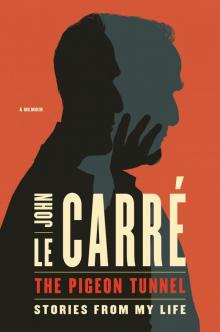 The Pigeon Tunnel: Stories From My Life
The Pigeon Tunnel: Stories From My Life Single & Single
Single & Single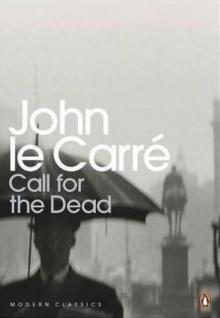 The Spy Who Came in From the Cold
The Spy Who Came in From the Cold The Looking Glass War
The Looking Glass War The Night Manager
The Night Manager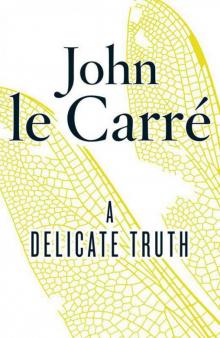 A Delicate Truth
A Delicate Truth A Perfect Spy
A Perfect Spy The Little Drummer Girl
The Little Drummer Girl Absolute Friends
Absolute Friends A Murder of Quality AND Call for the Dead
A Murder of Quality AND Call for the Dead The Russia House
The Russia House The Tailor of Panama
The Tailor of Panama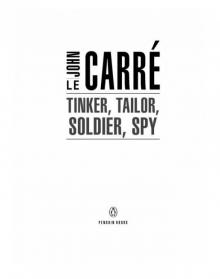 Tinker, Tailor, Soldier, Spy
Tinker, Tailor, Soldier, Spy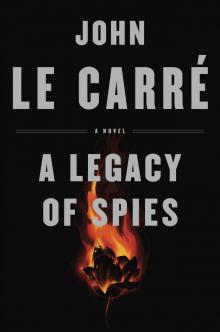 A Legacy of Spies
A Legacy of Spies The Mission Song
The Mission Song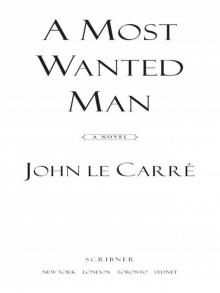 A Most Wanted Man
A Most Wanted Man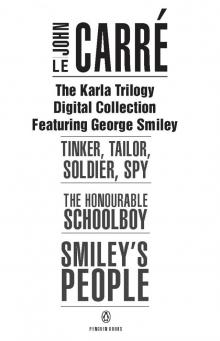 John Le Carré: Three Complete Novels
John Le Carré: Three Complete Novels The Secret Pilgrim
The Secret Pilgrim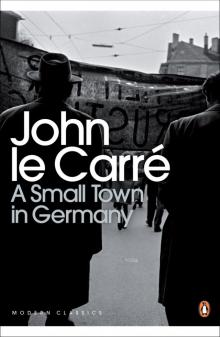 A Small Town in Germany
A Small Town in Germany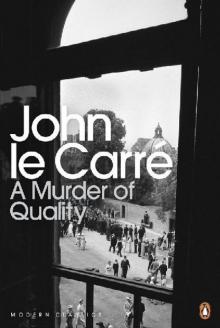 A Murder of Quality
A Murder of Quality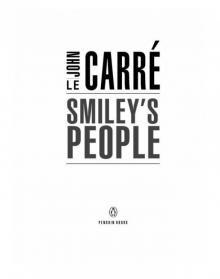 Smiley's People
Smiley's People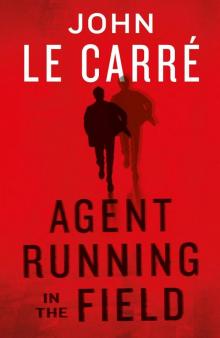 Agent Running in the Field
Agent Running in the Field The Spy Who Came in from the Cold s-3
The Spy Who Came in from the Cold s-3 The Pigeon Tunnel
The Pigeon Tunnel The Russia House - 13
The Russia House - 13 The Honourable Schoolboy
The Honourable Schoolboy Call For The Dead s-1
Call For The Dead s-1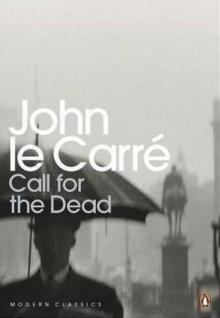 Call for the Dead
Call for the Dead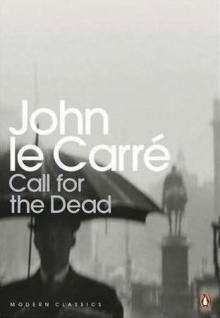 Call for the Dead - 1
Call for the Dead - 1